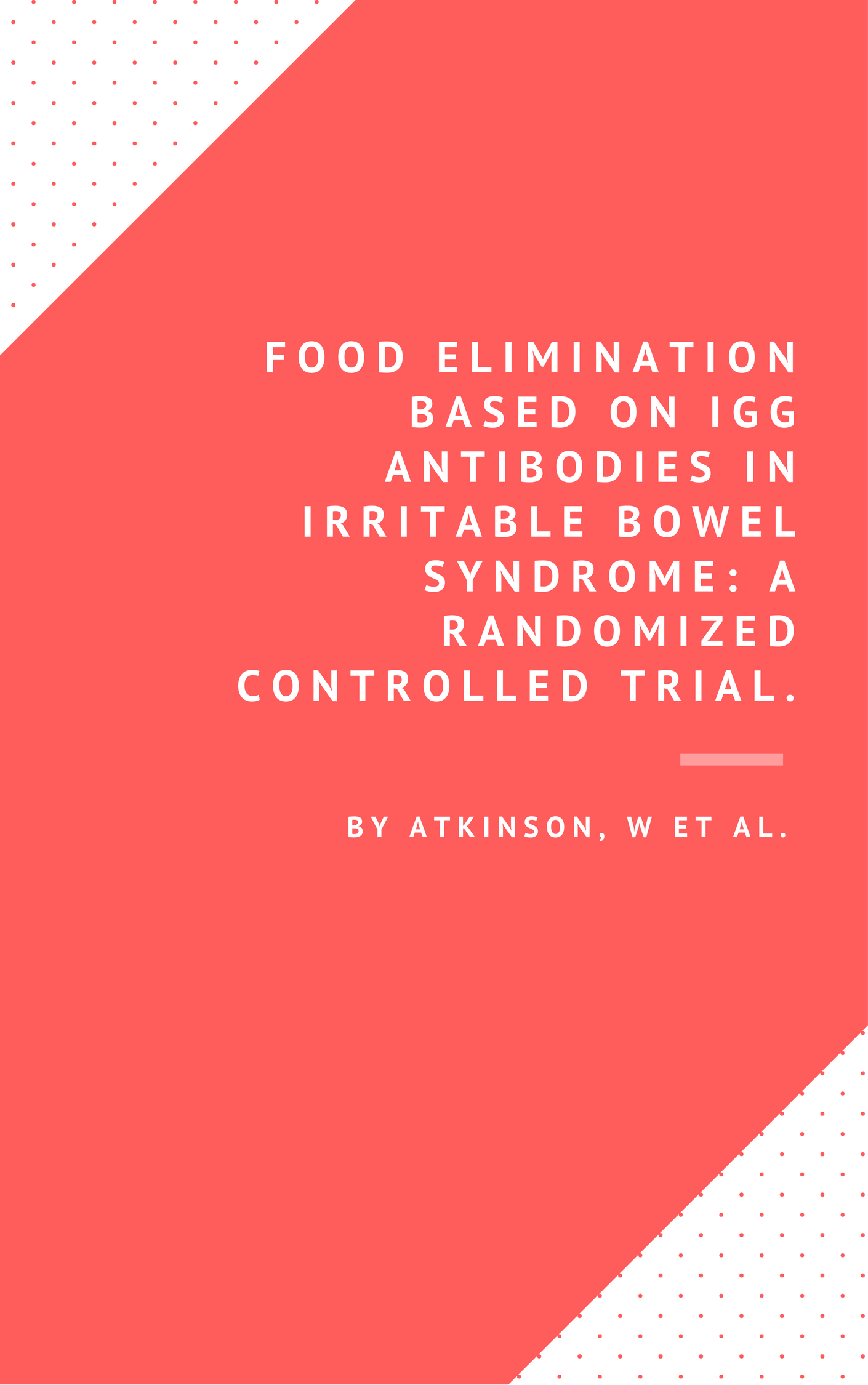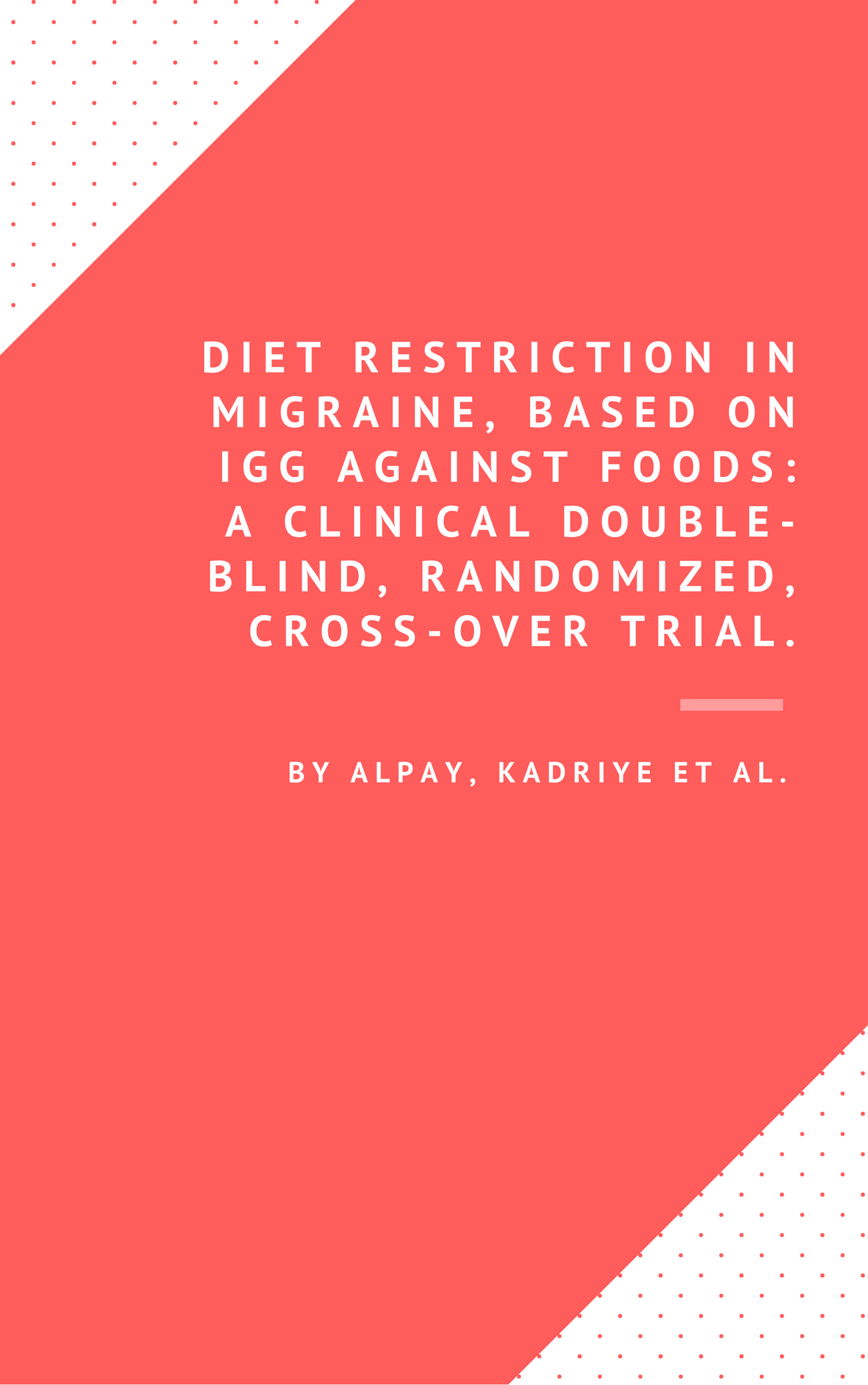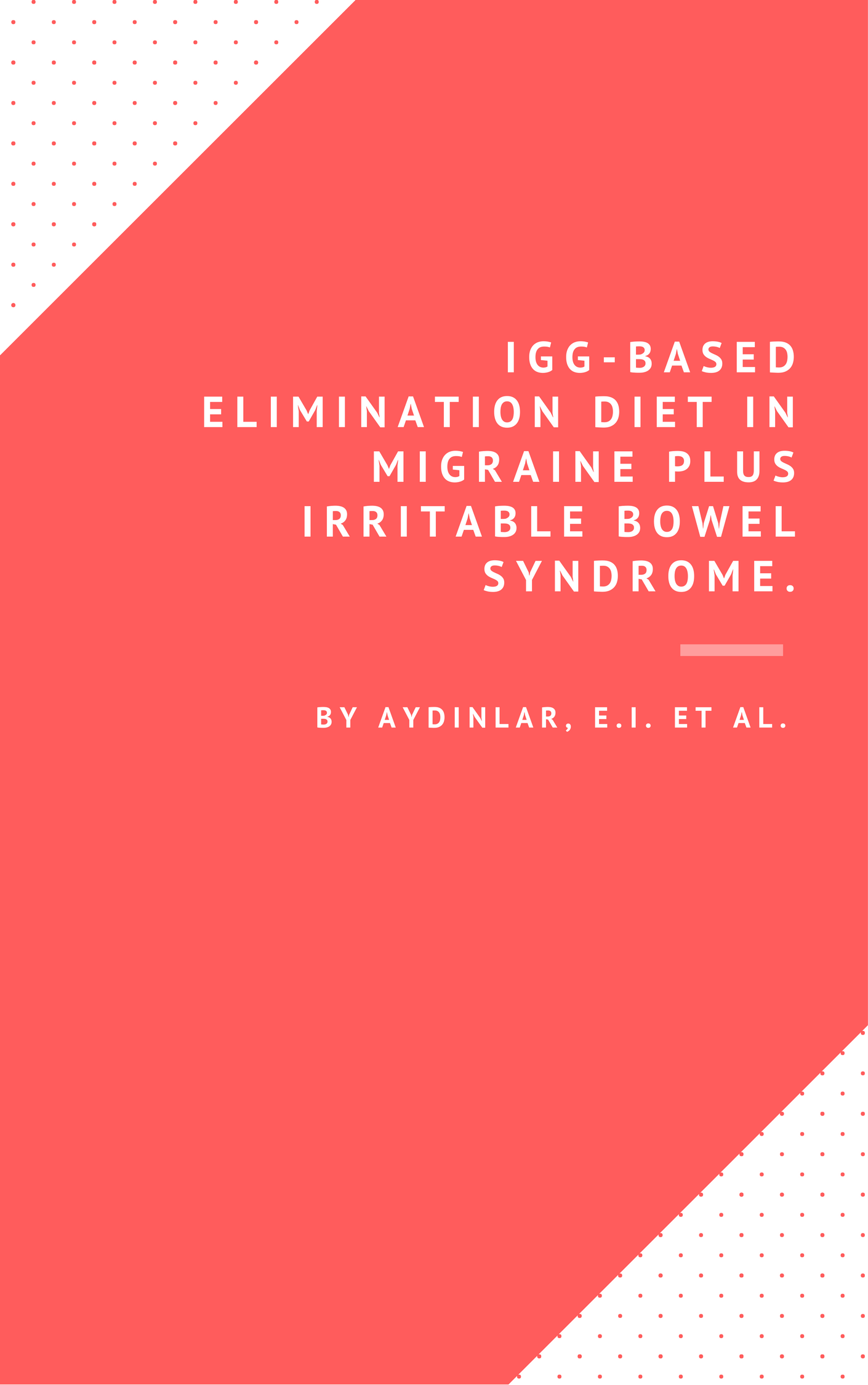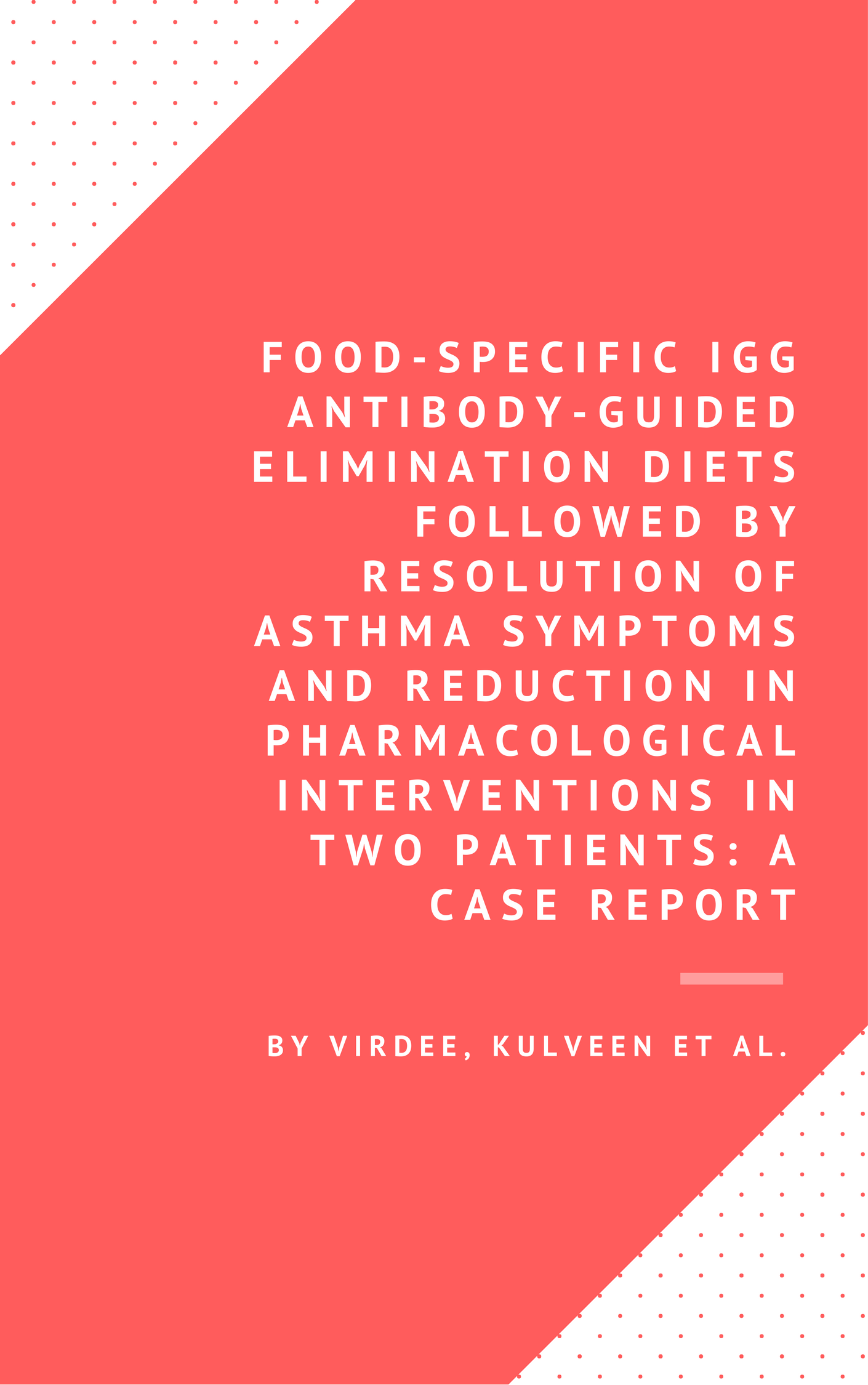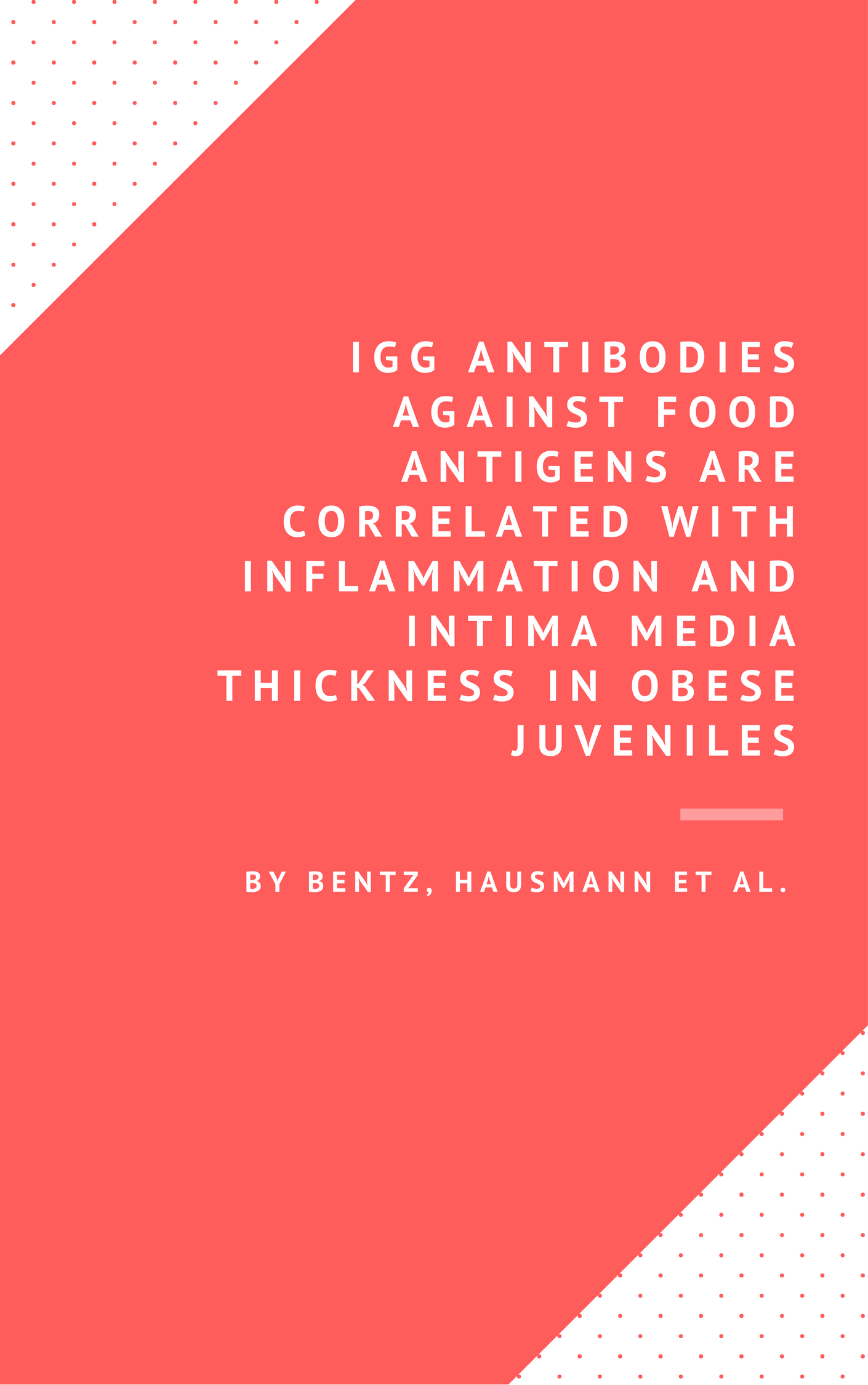SUMMARY:
The purpose of the study was to “assess the therapeutic potential of dietary elimination based on the presence of IgG antibodies to food.”
In a double blind, randomized, controlled study, 150 outpatients with IBS took an Enzyme Linked Immunosorbent Assay (ELISA) test to detect the presence of IgG antibodies to a panel of different food antigens. The patients were then randomly assigned either a “true” diet or a “sham” diet. The “true” diet excluded the foods that revealed elevated levels of IgG antibodies while the “sham” diet excluded an equal number of foods but did not raise any IgG levels.
RESULTS:
“After 12 weeks, the true diet resulted in a 10% greater reduction in symptom score than the sham diet with this value increasing to 26% in fully compliant patients.”
CONCLUSION:
“Food elimination based on IgG antibodies may be effective in reducing IBS symptoms and is worthy of further biomedical research.”
SUMMARY:
The goal of this study was to investigate the effect diet restriction based on IgG antibodies had in relation to migraine effects and severity.
After using an ELISA test to detect IgG antibodies, 30 patients diagnosed with migraine without aura “were randomized to a 6-week diet either excluding or including specific foods with raised IgG antibodies.”
Following this 6-week period, patients went through a 2-week diet-free period. After that buffer period, patients were then given the opposite 6- week diet than the one they received previously.
RESULTS:
A “statistically significant reduction in the number of headache days and number of migraine attacks” was found in the period patients eliminated raised IgG level reactive foods.
CONCLUSION:
“This is the first randomized, cross-over study in migraineurs, showing that diet restriction based on IgG antibodies is an effective strategy in reducing the frequency of migraine attacks.”
SUMMARY:
A total of 21 patients diagnosed with migraines and IBS were included in a “double-blind, randomized, controlled, cross-over clinical trial” to evaluate the “therapeutic potential of the immunoglobulin G (IgG)-based elimination diet.”
RESULTS:
In regards to “Headache Parameters”, “IBS Symptom Scores” as well as “Emotional Well-Being and Belief in IBS Treatment,” “Significant reductions were observed with the elimination diet” and was associated with “significantly higher scores for happiness at home, happiness at work, and belief in IBS treatment.”
CONCLUSION:
The findings of this particular study indicate that “food elimination based on IgG antibodies in migraine patients who suffer from concomitant IBS may effectively reduce symptoms from both disorders with potential savings to the health care system.”
SUMMARY:
This case report monitors the symptomatic changes of 2 patients with asthma (Patient A and Patient B) after utilizing an ELISA IgG antibody assessment and recommending “complete avoidance” of potential food intolerances.
RESULTS:
“Both of these patients demonstrated a substantial relief in symptoms of asthma and a decreased need for pharmacological control associated with initiating an IgG antibody–guided elimination diet.”
CONCLUSION:
“Based on the presented cases, in patients with poorly controlled asthma, physicians may consider routinely testing and screening patients for the presence of IgG food antibodies.
SUMMARY:
This study sought to identify whether Crohn’s Disease patients had higher immune responses against “auto-antigens” or “food-antigens” that perpetuated inflammation compared to healthy patients.
“Based on the IgG antibodies” found via an ELISA test, a nutritional intervention was planned and patients were then instructed to follow either a “specific” (true) or “sham” (false) diet.
RESULTS:
“The pilot study resulted in a significant difference of IgG antibodies in serum between CD patients and healthy controls…The daily stool frequency significantly decreased by 11% during a specific diet compared with a sham diet. Abdominal pain reduced and general well-being improved.”
CONCLUSION:
This particular study has “shown that IgG antibodies against food antigens are elevated in patients with CD in contrast to healthy controls. A clinically significant improvement in IBD symptoms was observed in patients eliminating foods to which they were found to exhibit sensitivity.”
SUMMARY:
The aim of the study was “to examine whether IgG mediated food intolerance is associated with inflammation and pre-atherosclerosis in obese juveniles.”
30 obese juveniles and 30 normal weight children were observed for this study.
RESULTS:
This study presents “that obese children have significantly higher IgG antibody values directed against food antigens than normal weight children. Anti-food IgG antibodies were found to be tightly associated with low grade systemic inflammation and with the IMT (Intima Media Thickness) of common carotid arteries in obese and normal weight juveniles.
CONCLUSION:
These findings raise the possibility that anti-food IgG is pathogenetically involved in the development of obesity and atherosclerosis.
SUMMARY:
This study utilized variations of ELISA assessments (IgG, IgA, and IgM) to test a previously reported claim that “increased serum levels of IgA antibodies to gluten occur regularly in untreated CD but rarely in healthy controls.”
RESULTS:
Adults and children with untreated CD showed similar serum activities to glyc-gli and gluten, which for both groups were increased in the IgG and IgA classes compared with healthy controls.
CONCLUSION:
“ELISA determination of serum IgA and IgG antibody activities to dietary proteins appears to be a valuable adjunct in the diagnosis and follow-up of CD, both in children and adults. Increased IgA activities to other dietary antigens are likewise relatively characteristic for untreated CD; monitoring of such antibodies may be particularly helpful in evaluating the response of patients on a gluten free diet.”
SUMMARY:
This report outlines “tests conducted to detect food-specific IgG antibodies in the serum of allergy dermatosis patients to explore its role in allergy dermatosis.”
An ELISA method assessment was performed to detect “specific antibody IgG in 14 kinds of food” to healthy subjects and allergy dermatosis patients alike.
RESULTS:
“Among 20 healthy subjects, 1 subject tested positive IgG antibody and the positive rate was 5.0%; among 181 patients with allergy dermatoses, 118 patients were tested positive IgG antibody and the total positive rate was 65.2%.”
CONCLUSION:
“To sum up, allergy dermatosis [is] closely related to food-specific IgG antibody, and the allergy dermatosis patients have a high incidence rate of food intolerance. Detecting IgG antibody in the serum of patients is of great significance for the diagnosis and treatment of allergy dermatosis.”
SUMMARY:
This study “assessed the food antibody levels in celiac children and [healthy] children.”
RESULTS:
The statistical analysis showed that there was a significant correlation between high IgM ELISA titers and low avidity of IgG.
CONCLUSION:
The study found that “celiac children at presentation have significantly higher levels of IgA and IgG antibodies to gliadin than reference children.” It also confirmed that they “also have elevated levels of other food antibodies as well.”



